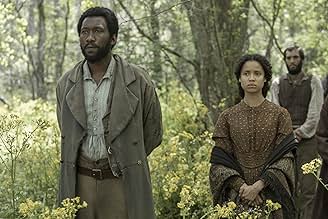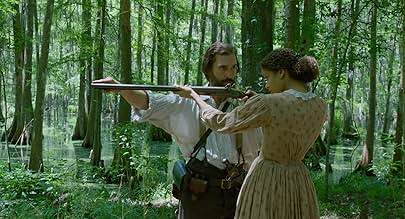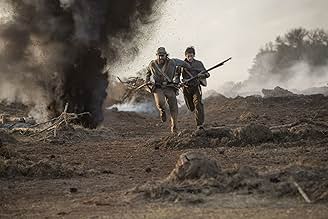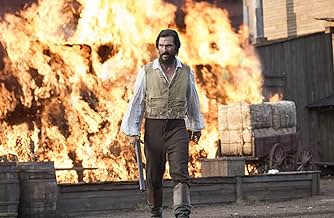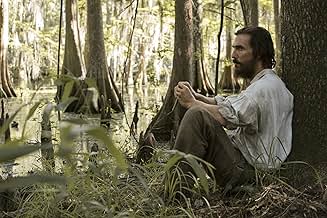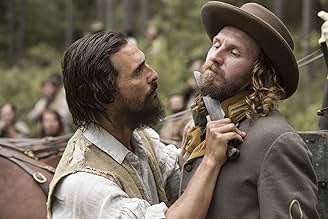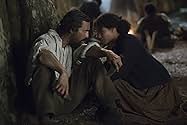Um desertor do exército confederado desiludido retorna ao Mississippi e lidera uma milícia de companheiros desertores e mulheres em um levante contra o governo local da confederação corrupto... Ler tudoUm desertor do exército confederado desiludido retorna ao Mississippi e lidera uma milícia de companheiros desertores e mulheres em um levante contra o governo local da confederação corrupto.Um desertor do exército confederado desiludido retorna ao Mississippi e lidera uma milícia de companheiros desertores e mulheres em um levante contra o governo local da confederação corrupto.
- Direção
- Roteiristas
- Artistas
- Prêmios
- 3 vitórias e 4 indicações no total
- Annie
- (as Jessica Collins)
- Wilson
- (as Donald Watkins)
Avaliações em destaque
The phrase "rich man's war,poor man's fight" never had more meaning than in the situation Knight finds himself in. He just walks away from the Confederate army and before long he's heading a movement back home seceding from the seceding Confederacy. Jones County opts for its own independence.
As played by Matthew McConaughey we see Knight certainly a person of humble circumstances who like Abraham Lincoln is a man who recognizes some great moral issues. McConaughey is humble and modest, but overwhelming in his portrayal. This film might get him a trip to the Oscars.
The two women in his life wife Keri Russell and Gugu Mbatha-Raw, the former slave who develops a relationship with McConaughey are also quite moving in their portrayal. Interracial relationships put McConaughey way ahead of his time. There is a modern story of one of his descendants unable to marry because of Mississippi's miscegenation laws post World War II. I'm not sure it was necessary for this film it kind of interrupted the flow of the main plot. In any event it probably deserved its own film.
Down the cast list there is a very moving performance by young Jacob Lofland in the beginning of the film as a young Confederate soldier who with McConaughey also realizes what business has he in a fight to protect some plantation owner's right to have slaves. You won't forget it if you see Free State Of Jones.
And you should see it.
In the early Civil War battle scenes, he plays a nurse. Knight is not shown mowing down the enemy with impressive, explosive gunfire. Rather, he is shown risking enemy fire in order to save men's lives, or to retrieve and bury the corpse of a boy shot in battle on his first day. My tears flowed freely during these scenes. Later, Knight himself cries after one of his men is hanged. But Knight gets his revenge, an eye-for-an-eye revenge scene that I won't soon forget.
Newton Knight was a white Mississippi farmer. He was the grandson of a slaveholder, but Knight owned no slaves himself. He served in the Confederate army, but deserted in 1862, after serving for almost a year. He was outraged by the Twenty Negro Law, that allowed families who owned twenty slaves to exempt one family member from service for every twenty slaves they owned.
Knight and other deserters formed The Free State of Jones, declaring their loyalty to the Union, and flying the stars and stripes rather than the stars and bars. After the war, Knight worked for Reconstruction and married Rachel, a freed slave woman. His children also married cross-racially. He died in 1922. As might be expected, he is a controversial figure in Mississippi. Fans of the Confederacy denounce him as a traitor. Others celebrate him as one white Southerner who had a conscience and resisted white supremacy.
Newt Knight was clearly someone with a bucketload of charisma. His power inspired men to fight to the death against their own nation. McConaughey radiates charisma in this role. He is masterful and yet intimate. I'd follow this Newt Knight into battle and feel proud to do so.
"Free State of Jones" is receiving negative reviews. It's easy to see why. There is something in this film to anger multiple grievance mongers.
First, race hustlers will hate this movie. Race hustlers want the official story to be that all whites are supremacists and all blacks are heroic. A film that depicts a white man who worked for black rights is taboo. Race hustlers anathematized "Mississippi Burning" and "The Help" for the same reason. Such a shame that the race hustlers' ideological blindfolds make it impossible for them to appreciate great art.
Liberals might hate this film for a couple of other reasons. I don't know if I've seen a movie where almost every scene hinges on how guns are used. Almost everyone is armed, and uses those weapons to keep breathing and to settle disputes. Even little girls have guns and use them heroically. Second amendment fans may love this film. It depicts what they dream of: oppressed citizenry taking up arms to defeat their own government.
In addition to clinging to their guns, these rebels cling to their God and their Bibles. This is one of the most religious American films I've seen in a while. It's an historical fact that Newt Knight was a devoutly religious Primitive Baptist – he didn't drink, for example. The film drives home Knight's Christianity. He is shown in a long scene using a quill to record a birth in his Bible. In one heartbreaking scene, a slave who has been sexually molested survives psychologically by reciting verses from Genesis. "Free State of Jones" practices a muscular Christianity. One eye-for-an-eye scene takes place in a church.
Republicans will be torn about "Free State of Jones." On the one hand, Knight, like many populist leaders, preaches against economic inequality. "No man should be poor just so that someone else can be rich." I can hear theater seats squeak as Republicans head for the exits. Knight's words, though, reflect the facts. Poor white Southerners were sabotaged by the slave economy and they knew it. That's why they deserted.
But Republicans, if they sit through the entire film, will see how the Republican Party was the favored choice of freed slaves in the post-Civil-War era.
There is a narrative problem in the film. The viewer expects "Free State of Jones" to end after the Civil War. I actually began tying my sneakers, readying to leave the theater. But the film keeps going in what feels like an anti-climax. Gary Ross, the filmmaker, wants to make a point: the Civil War was *not* the happy ending. The KKK rose up, and Jim Crow became entrenched. Black men who tried to exercise their right to vote were lynched. This is an important point, but the film should have been better structured so its narrative flow didn't stop before the film itself did.
"Free State of Jones" was clearly made by sticklers for authenticity. Everyone looks dirty and tired. The clothes look like clothes people wore in the nineteenth century. A confederate officer's uniform looks baggy and tacky, not sparkling and admirable. Scenes are shot in lamplight. I loved this aspect of the film, as will Civil War re-enactors.
There were a number of Unionist uprisings in the South during the Civil War (a fact that was carefully expunged from my history textbooks, growing up in the South, maybe to justify all the monuments celebrating the glorious Olde South that lurk around public parks and buildings to intimidate black Southerners - I guess). What other purpose could they possibly serve? To celebrate a defeat?
This movie finally points out the obvious: the Confederacy lost the war, but the planter class which owned the Confederacy did their damnedest to win the peace. Instead of being lynched like Mussolini, Confederate leaders returned to their lives, their plantations, just like the war had never happened. Even the slaves they lost were returned to them in the form of unpaid sharecroppers. The misery of the lives of freedmen is one of the strongest images to take away from this film, their alleged freedom snatched from them. No 40 acres and a mule to serve as some form reparation, they went on to endure a century of domestic terrorism at the hand of the KKK.
The movie itself is beautifully and sensitively acted and filmed. There are scenes of great brutality but which are never gratuitous. There are also scenes of great beauty. There are scenes which have enormous relevance to politics in America today where racism is the hallmark of one Presidential candidate and income inequality the hallmark of another.
Claims by the radical left that this movie is about a "white savior" are just silly. If anything, Gary Ross has eliminated most of the real-life incidents which dealt with Newton Knight's own actions on behalf of freedmen, probably to make the film more palatable to the radical left who, like the extreme right-wing can never be satisfied anyway. I do wish the radical left, rather than criticizing well-intentioned liberals like Gary Ross, would attack the real enemy. The State of Mississippi still incorporates the Confederate flag in its state flag... and social justice warriors are quibbling about degrees of "white saviordom"?
Matthew McConaughey hasn't put a foot wrong since Lincoln Lawyer and his performance here is among his best work. American actors are rarely convincing playing period roles but he totally inhabits the role - scraggly beard, greasy hair, terrible teeth and attitude. He looks like the daguerrotype of a tired and desperate Civil War soldier. Gugu Mbatha-Raw has flown too long under the radar: stunningly touching as an early 19th century biracial heiress in Belle and totally believable as a pop star headed for a nervous breakdown in Beyond the Lights, she brings a luminous quality to Rachel a resourceful woman who defined her own path despite the oppression of racist Southern culture.
Mahershala Ali's character won't be found in Prof. Bynum's books. The names of the maroons who fought with the Knight Company have been lost to history, so he is a composite character invented by Gary Ross. His character travels from runaway slave to armed insurgent to voting rights activist in Reconstruction. Ali imbues his character with wit, charm, warmth and extraordinary courage.
Keri Russell is fine in a small role. She gives her heartbroken character dignity and resilience.
Highly recommended.
I'm not a history buff, but also not opposed to learn about compelling stories, and this was one. Who knew that there was this sub-war going on in the middle of the Civil War, or about this Lincoln-esque southern guy willing to fight the good fight? Knight was an inspiring guy who somehow saw forest through the trees and had courage to do right in a world with wrong going on all around him.
The acting was quite good. I particularly enjoyed fresh faces like Mahershala Ali (Moses) and Gugu-Mbatha Raw (Rachel). The script was not full of period clichés or overly polish, things I appreciated in a movie like Tombstone, but could have been a distraction in Free State which fortunately kept it real.
Matthew McConaughey was excellent in the lead as the gritty Newton Knight. Not as gritty as his brother Rooster, but the grit suits him. Very believable. But this is not a movie that shines due to his good looks, rather from his good acting.
Some of the more critical reviews made comment about FSoJ as "hopelessly adrift", "trips over its own themes as it stumbles aimlessly," "is confusing", and "It's not that the story itself is hard to follow, but Gary Ross' script and direction fail to make clear key personal relationships in the film, and throughout its 2 ¼ hours, it makes the audience wonder where the story is going and whether this movie has much of a point at all."
Wow! All I can tell you is that I did not know the story, and there were some moments where it fumbles, but I kept up with it just fine. For me the movie's strengths far outweighed its weaknesses. Definitely not an average or sub-par movie — the subject matter alone puts it ahead of so many other films.
At times I questioned the casting on some of the supporting roles, but that may be Hollywood conditioning thing, and on reflection this cast probably showed what people were like back in that day.
After the movie I read up on the Davis Knight story. He was the great grandson who was embattled in a miscegenation trial in 1940s Mississippi. He was 1/8 African American, looked white (in the movie) and married a white woman; a crime back in the day in Mississippi. Have to wonder why they didn't prosecute the white wife. Hmm.
It goes to show you how much times have changed: now days in Mississippi Batman can marry Superman, dogs can marry cats, and democrats can marry republicans. You won't see any of that in Raqqa. It's a crazy mixed up world folks.
To sum things up, it's not a perfect movie, and there were some issues making it hard to track at times, but a fascinating sub-plot to the real Civil War, it kept my interest, and the acting was good. Any movie that has me reading up on its story after the film has got to be worth seeing.
The movie starts pretty much like any Civil War movie with battles, death and bloody bodies, but it progresses past that to the point where some people rebel against the Confederacy for the atrocities they commit against the southern farmers. The story is well told with some actual dates and facts flashed on the screen from time to time which sort of gives it the feel of a documentary. It helps keep things in perspective without being intrusive.
If I had anything to complain about, it would be then length and scope of the film. The movie ran about 2-1/2 hours. At about 2 hours, I thought it was over but then it moved into the Klan, voting intimidation and general mistreatment of the freed slaves as well as having a 100 year tie in to future generation. It was as if they tried to jam these events in to make it more politically acceptable to Hollywood. I just felt that they went beyond what the movie was actually to be about.
Você sabia?
- CuriosidadesIn 2016 a document was discovered in the National Archives which was a request by Newton Knight's company to join the Union Army in 1864. It lends validity to Knight's claims.
- Erros de gravaçãoWhen the plantation owner comes back home after the war and walks through the front door, a thermostat is visible on the wall to his left.
- Citações
Newton Knight: From this day forward we declare the land north of Pascagoula Swamp, south of enterprise and east to the Pearl River to the Alabama border, to be a Free State of Jones. And as such we do hereby proclaim and affirm the following principles. Number one, no man ought to stay poor so another man can get rich. Number two, no man ought to tell another man what you got to live for or what he's got to die for. Number three, what you put in the ground is yours to tend and harvest and there ain't no man ought to be able to take that away from you. Number four, every man is a man. If you walk on two legs, you're a man. It's as simple as that.
- ConexõesFeatured in The History of Jones County (2016)
- Trilhas sonorasBeautiful Dreamer
Written by Stephen Foster
Principais escolhas
- How long is Free State of Jones?Fornecido pela Alexa
Detalhes
- Data de lançamento
- Países de origem
- Centrais de atendimento oficiais
- Idioma
- Também conhecido como
- Lucha por la libertad
- Locações de filme
- Empresas de produção
- Consulte mais créditos da empresa na IMDbPro
Bilheteria
- Orçamento
- US$ 50.000.000 (estimativa)
- Faturamento bruto nos EUA e Canadá
- US$ 20.810.036
- Fim de semana de estreia nos EUA e Canadá
- US$ 7.572.206
- 26 de jun. de 2016
- Faturamento bruto mundial
- US$ 25.035.950
- Tempo de duração2 horas 19 minutos
- Cor
- Proporção
- 1.85 : 1







